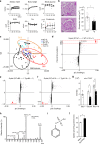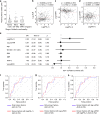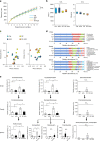Gut microbiome-derived phenyl sulfate contributes to albuminuria in diabetic kidney disease
- PMID: 31015435
- PMCID: PMC6478834
- DOI: 10.1038/s41467-019-09735-4
Gut microbiome-derived phenyl sulfate contributes to albuminuria in diabetic kidney disease
Abstract
Diabetic kidney disease is a major cause of renal failure that urgently necessitates a breakthrough in disease management. Here we show using untargeted metabolomics that levels of phenyl sulfate, a gut microbiota-derived metabolite, increase with the progression of diabetes in rats overexpressing human uremic toxin transporter SLCO4C1 in the kidney, and are decreased in rats with limited proteinuria. In experimental models of diabetes, phenyl sulfate administration induces albuminuria and podocyte damage. In a diabetic patient cohort, phenyl sulfate levels significantly correlate with basal and predicted 2-year progression of albuminuria in patients with microalbuminuria. Inhibition of tyrosine phenol-lyase, a bacterial enzyme responsible for the synthesis of phenol from dietary tyrosine before it is metabolized into phenyl sulfate in the liver, reduces albuminuria in diabetic mice. Together, our results suggest that phenyl sulfate contributes to albuminuria and could be used as a disease marker and future therapeutic target in diabetic kidney disease.
Conflict of interest statement
The authors declare no competing interests.
Figures






Comment in
-
Targeting the Gut for Early Diagnosis, Prevention, and Cure of Diabetic Kidney Disease: Is the Phenyl Sulfate Story Another Step Forward?Am J Kidney Dis. 2020 Jan;75(1):144-147. doi: 10.1053/j.ajkd.2019.07.001. Epub 2019 Aug 23. Am J Kidney Dis. 2020. PMID: 31451331 No abstract available.
References
Publication types
MeSH terms
Substances
LinkOut - more resources
Full Text Sources
Other Literature Sources
Medical

